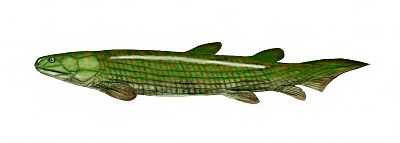Osteolepidida
From Wikipedia, the free encyclopedia
| Osteolepidida Temporal range: 396–299Ma Middle Devonian to Late Carboniferous | |
|---|---|
 | |
| Osteolepis. | |
| Scientific classification | |
| Kingdom: | Animalia |
| Phylum: | Chordata |
| Subphylum: | Vertebrata |
| Class: | Sarcopterygii |
| Subclass: | Tetrapodomorpha |
| Superorder: | Osteolepidida* |
| Clades | |
| |
Osteolepidida are a group of prehistoric lobe-finned fishes which appears first time during the Devonian period. The order contains five families: Canowindridae, Elpistostegidae, Megalichthyidae, Osteolepidae and Tristichopteridae. The superorder is generally considered to be paraphyletic because the characters that define it are mainly attributes of stem tetrapodomorphs.[1]
Below is a cladogram showing the paraphyly of Osteolepiformes compiled and modified from Ahlberg and Johanson (1998).[1] See also Swartz 2012.[2] The Osteolepiformes are marked by the green bracket.
|
Osteolepidida |
References
- ↑ 1.0 1.1 Ahlberg, P. E.; and Johanson, Z. (1998). "Osteolepiforms and the ancestry of tetrapods". Nature 395 (6704): 792–794. Bibcode:1998Natur.395..792A. doi:10.1038/27421.
- ↑ Swartz, B. (2012). "A marine stem-tetrapod from the Devonian of Western North America". PLoS ONE 7 (3): e33683. doi:10.1371.2Fjournal.pone.0033683. PMC 3308997. PMID 22448265.
External links
| ||||||||||||||||||||||||||
This article is issued from Wikipedia. The text is available under the Creative Commons Attribution/Share Alike; additional terms may apply for the media files.